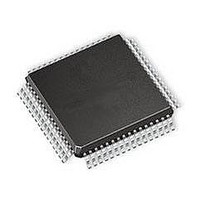SI3225-G-GQ Silicon Laboratories Inc, SI3225-G-GQ Datasheet - Page 31

SI3225-G-GQ
Manufacturer Part Number
SI3225-G-GQ
Description
IC PROSLIC/CODEC DUAL 64TQFP
Manufacturer
Silicon Laboratories Inc
Series
ProSLIC®r
Datasheet
1.SI3200-G-FSR.pdf
(112 pages)
Specifications of SI3225-G-GQ
Function
Subscriber Line Interface Concept (SLIC), CODEC
Interface
GCI, PCM, SPI
Number Of Circuits
2
Voltage - Supply
3.3V, 5V
Current - Supply
65mA
Power (watts)
941mW
Operating Temperature
-40°C ~ 85°C
Mounting Type
Surface Mount
Package / Case
64-TQFP, 64-VQFP
Includes
Battery Switching, BORSCHT Functions, DTMF Generation and Decoding, FSK Tone Generation, Modem and Fax Tone Detection
Lead Free Status / RoHS Status
Lead free / RoHS Compliant
Available stocks
Company
Part Number
Manufacturer
Quantity
Price
Company:
Part Number:
SI3225-G-GQ
Manufacturer:
Silicon Laboratories Inc
Quantity:
10 000
Company:
Part Number:
SI3225-G-GQR
Manufacturer:
Silicon Laboratories Inc
Quantity:
10 000
3.2. Power Supply Sequencing
Note: This section applies to Si3200 revision E only.
To ensure proper operation, the following power
sequencing guidelines should be followed:
The Si3200 revision E features an ESD clamp
protection circuit connected between the V
V
ESD damage when the device is being handled out-of-
circuit during manufacture. Precautions must be taken
in the V
power-up, the V
0 V to their respective target values in a linear fashion
and must not exhibit fast transients or oscillations which
could cause the ESD clamp to be activated for an
extended period of time resulting in damage to the
Si3200. The resistors shown as R20 through R23
together with capacitors C23, C24, C30 and C31 on
Figure 12 and R23 through R26 along with capacitors
C24, C25, C32 and C33 in Figure 13 provide some
measure of protection against in-circuit ESD clamp
activation by forming a filter time constant and by
providing current limiting action in case of momentary
clamp activation during power-up. These resistors and
capacitors must be included in the application circuit,
while ensuring that the V
supplies are designed to exhibit start-up behavior that is
free of undesirable transients or oscillations. Once the
V
ESD clamp has circuitry that prevents it from being
activated by transients slower than 10 V/µs. In the
steady powered-up state, the V
therefore not exhibit transients resulting in a voltage
slew rate greater than 10 V/µs.
3.3. DC Feed Characteristics
The Si3220 and Si3225 offer programmable constant-
voltage and constant-current operating regions as
illustrated in Figure 14. The constant voltage region
BATH
DD
V
voltage at least 20 ms before V
begin to ramp to its desired voltage.
Transients and oscillations with a dv/dt above 10 V/
µs on the V
avoided.
The ramp-up time for V
2 ms to 20 ms. The ramp-up time for V
be in the range of 10 ms to 150 ms. Slower ramp-up
times are not recommended.
V
V
up.
DD
BATL
BATH
and V
rails. This clamp protects the Si3200 against
should be allowed to reach its steady state
DD
rail must never be more negative than the
rail during any part of the power supply ramp-
BATH
and V
DD
are in their steady state final values, the
DD
BATH
and V
and V
system power supply design. At
BATH
BATH
DD
DD
supplies should always be
should be in the range of
and V
rails must ramp-up from
DD
BATH
and V
BATH
is allowed to
BATH
system power
BATH
rails must
should
DD
and
Rev. 1.3
(defined
programmable from 0 to 63.3 V in 1 V steps. The
constant current region (defined by the loop current
limit, I
0.87 mA steps. The Si3220 and Si3225 exhibit a
characteristic dc impedance of 640 Ω or 320 Ω during
active mode. (See "3.4. Adaptive Linefeed" on page 34).
The TIP-RING voltage (V
programmable voltage (V
voltage headroom to the most positive terminal
(typically the TIP lead in normal polarity or the RING
lead in reverse polarity) for carrying audio signals. A
similar programmable voltage (V
between the most negative terminal and the battery
supply rail for carrying audio signals. (See Figure 14.)
The user-supplied battery voltage must have sufficient
amplitude under all operating states to ensure sufficient
headroom. The Si3200/2 may be powered by a lower
secondary battery supply (V
dissipation when driving short-loop lengths.
3.3.1. Calculating Overhead Voltages
The two programmable overhead voltages (V
V
V
normal operating conditions, these overhead voltages
are sufficiently low to maintain the desired TIP-RING
voltage (V
under which the user must exercise care in providing a
battery supply with enough amplitude to supply the
required TIP-RING voltage and enough margin to
accommodate these overhead voltages. The V
voltage is programmed for a given operating condition.
Therefore, the open-circuit voltage (V
according to the required overhead voltage (V
the supplied battery voltage (V
pay attention to the maximum V
be required for each operating state.
In the off-hook active state, sufficient V
maintained to correctly power the phone from the
CM
BAT
Figure 14. DC Linefeed Overhead Voltages
) represent one portion of the total voltage between
and ground as illustrated in Figure 14. Under
LIM
V
Si3220/25 Si3200/02
) is programmable from 18 to 45 mA in
by
OC
Secondary V
Constant I Region
V
BATL
). However, there are certain conditions
Selected
the
V
OV
(Forward State)
BAT
open-circuit
V
CM
OC
Constant V Region
CM
) is offset from ground by a
BATL
Loop Closure Threshold
V
) to provide sufficient
OV
BAT
OV
) to reduce total power
V
OC
voltage,
). The user should
and V
OV
V
V
V
RING
) is an offset
BATH
TIP
R
LOOP
CM
OC
OC
that might
V
) varies
must be
OV
OC
OV
) and
)
and
CM
31
is













